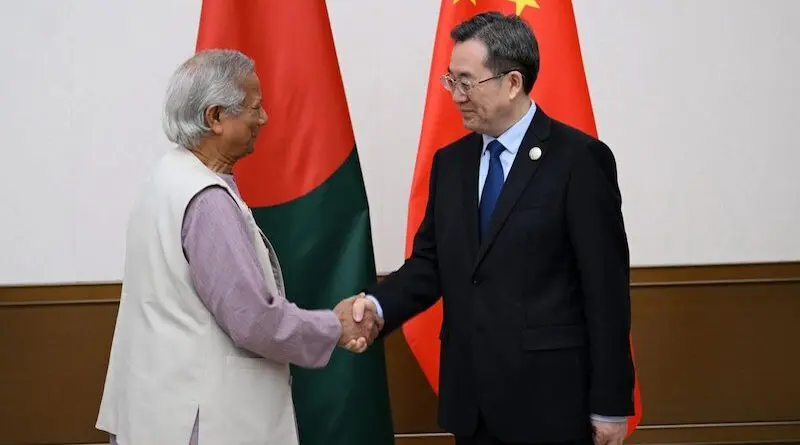Deciphering The Future: Chief Advisor Dr. Yunus’s Historic Visit To China – OpEd
As Chief Advisor Dr. Muhammad Yunus visits China from March 26 to 29, the diplomatic landscape between Bangladesh and China is poised for a significant shift. This visit, marking five decades of diplomatic relations between the two nations, comes at a critical juncture for Bangladesh, both domestically and internationally. The trip is not merely a ceremonial gesture but a strategic move that could redefine the contours of Bangladesh-China relations, with profound implications for regional geopolitics and economic development.
Bangladesh and China have been celebrating 50 years of diplomatic ties in 2025, a milestone in their enduring partnership characterized by mutual respect, strategic cooperation, and shared growth. Despite recent political unrest in Bangladesh, China remains a steadfast ally, committed to supporting unity and revitalization in the Global South. In July 2024, Bangladesh and China elevated their relationship to a Comprehensive Strategic Cooperative Partnership, underscoring mutual respect for sovereignty and supporting Bangladesh’s long-term development goals.
Economically, China is Bangladesh’s largest trading partner, with bilateral trade exceeding $20 billion annually. However, this relationship is heavily skewed in China’s favor, with Bangladesh importing far more than it exports. In the 2023-24 fiscal year, China’s exports to Bangladesh were valued at $16.63 billion, while Bangladesh’s exports to China were significantly lower, at approximately $677 million in 2022-23. The potential signing of a Free Trade Agreement (FTA) with China by 2026 raises concerns among Bangladeshi policymakers, who fear it could further undermine the local manufacturing sector unless carefully negotiated to protect Bangladesh’s economic interests.
China has provided significant economic assistance to Bangladesh, including investments in infrastructure projects like the Padma Bridge and Mongla Port. These projects have been instrumental in addressing Bangladesh’s infrastructure deficits and supporting its economic growth. The Padma Bridge, for instance, is expected to boost GDP by 1 percent annually, while the Mongla Port development aims to enhance maritime connectivity and trade efficiency. However, allegations of inflated project costs and delays in implementation have raised questions about transparency and accountability. Addressing these issues will be crucial for sustaining public trust in bilateral cooperation.
In terms of public perception, Bangladeshis view relations with China very positively. A recent survey showed that over 75 percent of respondents see relations with Beijing positively, compared to only about 11 percent for India. Positive perceptions of China in Bangladesh rose to 66.7 percent in 2024 from 60.1 percent in 2022, with 85 percent recognizing China’s economic and technological progress. This favorable public opinion provides a strong foundation for deepening bilateral ties.
Dr. Yunus’s visit to China also highlights new areas of cooperation, such as healthcare. China has designated three hospitals in Kunming for Bangladeshi patients, addressing recent challenges faced by Bangladeshis seeking medical treatment abroad due to visa complications in India. This initiative reflects China’s willingness to support Bangladesh’s healthcare sector and demonstrates its strategic approach to building comprehensive partnerships. Additionally, China has pledged to build state-of-the-art hospitals in Bangladesh, aiming to provide advanced medical facilities domestically while maintaining an option for treatment in China. The success of these initiatives will depend on addressing the cost issue, ensuring it is competitive compared to treatment options in India.
Geopolitically, China’s deepening engagement with Bangladesh poses challenges for India, which views China’s expanding influence in South Asia with concern. Bangladesh must navigate this complex landscape carefully, balancing its relations with both China and India to maximize economic benefits while maintaining regional stability. China’s statement that Bangladesh features importantly in its neighborhood diplomacy underscores its commitment to maintaining close ties with Bangladesh, despite the absence of a common border.
The visit also comes at a time when Bangladesh is evaluating its participation in China’s Global Development Initiative (GDI), Global Security Initiative (GSI), and Global Civilization Initiative (GCI). These initiatives reflect China’s ambition to play a leading role in global governance and development, and Bangladesh’s participation could enhance its international stature while securing vital economic support. However, Bangladesh has been cautious in embracing these initiatives fully, reflecting a desire to avoid alienating India and the West.
In the context of regional dynamics, Bangladesh’s engagement with China is part of a broader strategy to diversify its foreign policy and reduce dependence on any single partner. This approach allows Bangladesh to leverage its strategic position in South Asia to secure economic benefits and diplomatic support from multiple sources. The visit to China is a key component of this strategy, as it seeks to strengthen economic ties, enhance regional influence, and navigate the complexities of global geopolitics.
Furthermore, the visit highlights the importance of cultural and educational exchanges between the two nations. China has been promoting cultural ties through scholarships, Confucius Institutes, and cultural exchanges. However, Bangladesh must balance these ties with its historical cultural connections with India and the West. This balance is crucial for maintaining a diverse and inclusive cultural landscape that reflects Bangladesh’s rich heritage.
To conclude, the coming years will be crucial for Bangladesh as it navigates its relationships with major powers while ensuring that its economic and strategic interests are protected. The Chief Advisor’s visit to China is a step in this direction, signaling Bangladesh’s readiness to engage with the world’s leading economies and to leverage these partnerships for sustainable development and peace. As Bangladesh celebrates five decades of diplomatic ties with China, it is poised to embark on a new chapter in their relationship, one that promises to be transformative for both nations.

